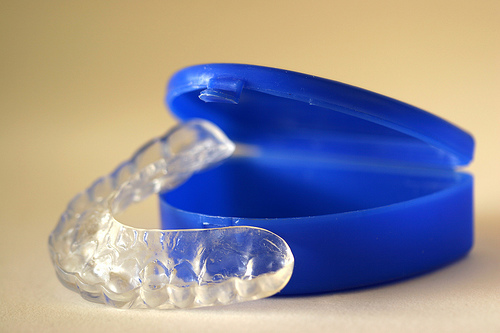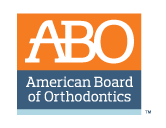Mouthguard Q&A
August 23rd, 2016

Today, Dr. R. William Barnard and our team at R. William Barnard Orthodontics thought we would talk about mouthguards, what they are, where to get them, and when to use them.
Q: What is a mouthguard?
A: A mouthguard, which is made of soft plastic, is a flexible, removable device that fits in your mouth and is adapted to fit comfortably to the shape of your upper teeth. A mouthguard will protect not only the teeth, but also your jaws, lips, tongue, cheeks, and gums, and should be worn anytime you are participating in full-contact athletic or recreational activities that may result in injury.
Q: How do mouthguards work? Why are mouthguards important?
A: A mouthguard works as a shock absorber to cushion your mouth from the effects of a blow to the face, head, or neck. Mouthguards protect teeth from not only fractures, but also hold the tongue, lips, and cheeks away from the teeth to avoid lacerations. Using a mouthguard as instructed by Dr. R. William Barnard can lessen the possibility of concussion and temporomandibular joint (TMJ) dislocation while you are out on the court or field. Increasingly, organized sports are requiring mouthguards to prevent injury to athletes, and research shows most mouth injuries occur when athletes are not wearing mouth protection.
Q: When should I wear a mouthguard?
A: Whenever you are participating in an activity that involves a risk of falling or head contact with other players. This includes football, baseball, basketball, soccer, hockey, and other competitive sports.
Q: How do I choose a mouthguard?
A: Dr. R. William Barnard and our team encourage you to choose a mouthguard that you can wear comfortably. There are several options of mouthguards you may choose from. First, preformed or what we call “boil-to-fit” mouthguards are found in sports stores. But your best choice is asking us for one during your next visit as we can fabricate a custom mouthguard for you at our Omaha office. A custom mouthguard will be more comfortable to wear and more effective in preventing injuries.
If you have any additional questions about mouthguards, please give us a call or ask us during your next visit!
Invisalign® vs. Traditional Braces
August 16th, 2016

A great smile can go a long way. Scientific research suggests that people who smile are perceived as more attractive and confident than those who don’t flash their pearly whites. When it comes time to invest in orthodontics to improve your beautiful smile, choosing the best option can be daunting. Comparing Invisalign to traditional braces is a great way to determine what orthodontics make most sense for your unique smile.
How is Invisalign different?
Unlike traditional braces, in which brackets are affixed onto each tooth and connected by wires Invisalign corrects orthodontic problems using a set of clear trays. These trays are specially formed to fit your teeth, allowing you to wear them 24/7.
Aesthetics
One of the primary advantages of Invisalign is that the clear trays are nearly invisible. Particularly for adults self-conscious about appearing professional with traditional braces, Invisalign can correct orthodontic issues without capturing the notice of others. Their nearly invisible appearance is one of the topmost reasons that orthodontic patients choose Invisalign.
Complexity of the Orthodontic Problem
Invisalign works well for people who have relatively minor problems, such as crooked teeth or small gaps between teeth. For more complex problems, particularly issues with bite or vertical problems (i.e., one tooth being significantly higher than another), traditional braces may be better at pulling teeth into alignment.
Eating and Drinking
Invisalign trays are removable, meaning that you cannot eat or drink while wearing them. Unlike traditional braces, however, you are not limited in the foods you may eat. Chewy, sticky, or hard foods may be eaten, provided that you brush your teeth before reinserting the Invisalign trays.
In the end, only you can weigh the pros and cons of Invisalign versus traditional braces. Consult with Dr. R. William Barnard to understand how these orthodontic interventions may work for your unique situation.
Oral Health Concerns for Teens
August 9th, 2016

You have a lot more freedom as a teenager than you did as a young child. You also have a lot more responsibilities, and one of your jobs is to take care of your teeth. Develop and maintain good dental habits now so you can have great dental health for life!
Tooth Decay
As a teenager, you risk tooth decay, or dental cavities, if you are not careful. In fact, 59% of adolescents aged 12 to 19 have at least one cavity, according to the National Institute of Dental and Craniofacial Research. Dr. R. William Barnard and our staff recommend keeping your teeth strong and healthy by brushing at least twice a day and flossing every day.
If you suspect that you have tooth decay, do not be embarrassed. Instead, ask your parents to bring you to R. William Barnard Orthodontics to get it looked at. When you do not treat your dental cavities, they can turn into more serious problems. A severely damaged tooth may need to be treated with a root canal or even an extraction.
You can take easy steps to prevent tooth decay when you are at school or hanging out with your friends. Carry a bottle of water around with you so you can take a sip after you eat any kind of food. Choose water or milk instead of soda or sports drinks, and if you chew gum, select a sugar-free flavor.
Other Oral Health Concerns
You can probably think of many reasons why you should not smoke or use tobacco. Your oral health is another one. Tobacco gives you bad breath and stains your teeth yellow. It also increases your risk for gum disease and cancer of the mouth. Smoking even slows the speed of healing after you have dental procedures done.
Here are a few more tips that can keep your mouth attractive and healthy during your teen years.
- Drink plenty of milk.
- Limit candies and sugary snacks.
- Wear a mouthguard if you play a contact sport.
- Visit R. William Barnard Orthodontics twice a year.
- Reduce infections and avoid piercing your tongue and lips.
You only get one set of permanent teeth in your life, so get in the habit of taking care of them now!
It's time to go back to school!
August 2nd, 2016

Now that many of the schools in Omaha are back in session, Dr. R. William Barnard would like to remind all of our patients about the importance of scheduling appointments in advance. With school, clubs, sports, and family duties to consider, we know that it can be challenging to find time to visit R. William Barnard Orthodontics this fall. In order to accommodate all of our patients’ busy schedules, it is important that you plan ahead for your appointments so that we are able to provide you with a convenient appointment time.
As always, please remember to give us advanced notice if you’re unable to make your regularly scheduled appointment with Dr. R. William Barnard and our team. Feel free to give us a call if you have any questions, or if you would like to schedule your fall appointment.
We’ll see you soon and hope summer is winding down nicely for you and your family!










